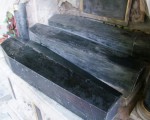For Weddings, Baptisms and Funerals
John Vigar
- Region:
- East of England
- Notice Period:
- Regular (more than one month's notice)
- Type:
- Professional
- Fee:
- Paid
- Category:
- History
- Updated:
- 30th March 2019
This lecture is a stand alone title but follows on from John’s popular presentation Murder, Sex and Mayhem in English Churches in which he told the story of human tragedy and frailty as depicted in our parish churches.
In For Weddings, Baptisms and Funerals he builds on this approach to show how pictures and objects in our churches introduce us to historic practices – many of which have been forgotten or superseded – surrounding the so-called Rites of Passage.
Our first rite of passage – Baptism – is discovered via Holy Wells, fonts with their covers, canopies and chrismatories.
The second rite of passage – Holy Matrimony – is inextricably linked to church porches, mazers and Church Ales.
Our final rite of passage – the Funeral – is discussed though wall paintings of a sexton’s implements, huts to protect eighteenth century parsons at the graveside, and depictions of the last rites.
The lecture uses illustrations including carvings, wall paintings, stained glass and objects to show a thousand years of depictions of the milestones in our human journey.
Views: 2082 | Enquiries: 2About John Vigar
John has been a professional speaker for over 40 years. He lectured for the University of Kent from 1992 to 2010, teaching a variety of architectural and social history studies, and has worked on a sessional basis for many other academic institutions. He taught at Denman (the national college of the Women’s Institute near Oxford) for over 35 years. An enthusiastic and popular approach to his subject ensures that he has a large following of regular students.
In addition to his contracted lectures John is a popular speaker at meetings of many different groups including The Arts Society ( formerly NADFAS), the National Trust, and historical societies country-wide. His lecture tours to public Libraries and Colleges in Germany where he speaks on English literature and its links with topographical history are also well received.
John Vigar`s specialist subject is ecclesiology – the study of church architecture and associated topics. He has written extensively on the subject and regularly leads tours to churches across England, both as part of his own programme of activities, and for other organisations. John has written the guidebooks for several hundred churches and is the author of books on the historic churches of both Kent and Sussex. He has visited and recorded over 13,000 of the 16,000 Anglican churches in England and Wales.
After retiring from university lecturing John worked for 13 years in the south-east region of The Churches Conservation Trust and he is a Trustee of the oldest church conservation body, The Friends of Friendless Churches. John is also a member of the Advisory Council of The Norfolk Churches Trust and has previously served as Hon Sec of the Ledgerstone Survey of England and Wales and as Photographic Curator of The Kempe Society. He is a Trustee of The Francis Coales Charitable Foundation.
He runs the www.kentchurches.info and www.hampshirechurches.co.uk websites
All lectures now available by Zoom.
Other Talks on SpeakerNet by John Vigar
- Leave No Stone Unturned
- Crenels and Merlons
- Murder Sex and Mayhem in English Churches
- Bedrooms, Banquets and Balls
- Curious Kent
- Churches in Retirement
- Exploring Sussex Churches
- Exploring Kent Churches
- Britain with Betjeman
- Superior Seats - where did we sit in church?
- The Church's Restoration
- Treasures in Norfolk Churches
- A chip off Queen Victoria’s Block
Send a message to the speaker
If you are interested in this talk and wish to contact the speaker, please complete the following form:


